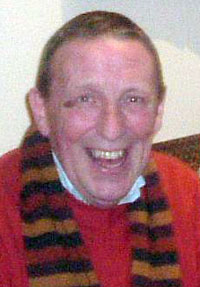6 November 2008 Edition
Fógraí bháis

Belfast republican Cormac Mac Airt
Cormac Mac Airt
The death has occurred of Belfast republican Cormac Mac Airt. Cormac is survived by his partner Cathy, sons Cormac, Séamus, Dermot and Micheál and daughter Joanne. Cathy and Cormac lost a son – Seán Tomás at one year old.
Cormac was interned in Long Kesh in the early ‘70s. On release he became active again in Óglaigh na hÉireann and was re-arrested in 1976. In all he spent 13 in the Kesh and Crumlin Road. He was an inspiration to his fellow POWs in jail and was on the ‘No wash’ and ‘Blanket’ protests. He was also central in the successful escape from Long Kesh in 1983 when at the request of Bobby Storey he agreed to work as an orderly so as to be enabled to convey messages between the various wings. “He was feared by the screws – they wouldn’t mess with Cormac,” recalls a comrade.
He had a devilish sense of humour and loved music and would be heard singing in the Blocks during the Blanket protest. He had a close circle of friends in the Blocks amongst them the late Joe McDonnell. He was very much a family man and deeply loved his partner Cathy and their children. We carry here a tribute to Cormac from Jim Gibney.
Cormac Mac AIrt was the first Teddy Boy I met or at least at the time I thought he was a Teddy Boy. I was 12 and he was 14 or 15. It was 1965 or 1966. Cormac’s attire on the first formal occasion I met him was something else. He was dressed from head to toe in black. He had a black knee length overcoat, black long trousers, black boots and to round it off he sported a black pork-pie hat. He was leaning against May Young’s shop a few yards away from his family home in Beechfield Street. He had a fag burning in the corner of his mouth and with the other free side of his mouth he spoke to me, ‘Alright kid’, he said like he was an elderly teenager to my eleven years. I muttered something whilst admiring his style.
There were others there with him, bigger boys than me. He was regaling them with one story after another but the fag never left his mouth nor did it seem to burn out. There was plenty of laughter and larking about and Cormac was the centre of it. I stood with my pal Jimmy Lundy at the corner of Madrid and Bryson Street and Cormac stood at his corner where I met him dressed in black as dusk settled; the corners were less than one hundred yards apart. I stood there nightly with my pal whiling away the time in quiet reflection occasionally looking up to see if Cormac was at his corner which he sometimes was. You knew when he was there by the sound of laughter.
As happens with teenagers our lives went in separate directions until I met Cormac again when I was 16 and he was a few years older. His dress sense was still as good as his sense of humour but we had moved on from the street corners to other locations. The talk wasn’t about designer labels but about the IRA and about people’s homes needing defended.
It was 1970 and the Short Strand was a community under siege from loyalists and the B Specials. The district’s teenagers all too quickly shed their teenage ambitions and were part of a world where guns and bombs, petrol and gelignite, were the topics for conversation.
Cormac was part of those early years when the IRA was finding its way out of obscurity into the public arena. At meetings he said very little but he was one of those IRA volunteers who delivered. He was resourceful. He was also confident and solid: qualities not usually associated with someone as young as he was then.
The turnout at Cormac’s funeral said it all. It was not only impressive in its size but in who was there; IRA volunteers spanning 40 years paid their respects; ex-prisoners – especially former blanketmen – swelled the cortège.
Bobby Storey’s excellent oration captured the essence of Cormac Mac Airt. He loved life. He deeply loved Cathy his partner and his extended family. He was funny and serious when the times required it. The IRA needed Cormac when he was a teenager on the streets of the Short Strand and he was with them. He was needed in difficult situations inside the prisons, particularly on the blanket protest, and in preparing for the Great Escape, and he was there.
Cormac was a loyal Volunteer from beginning to end.
